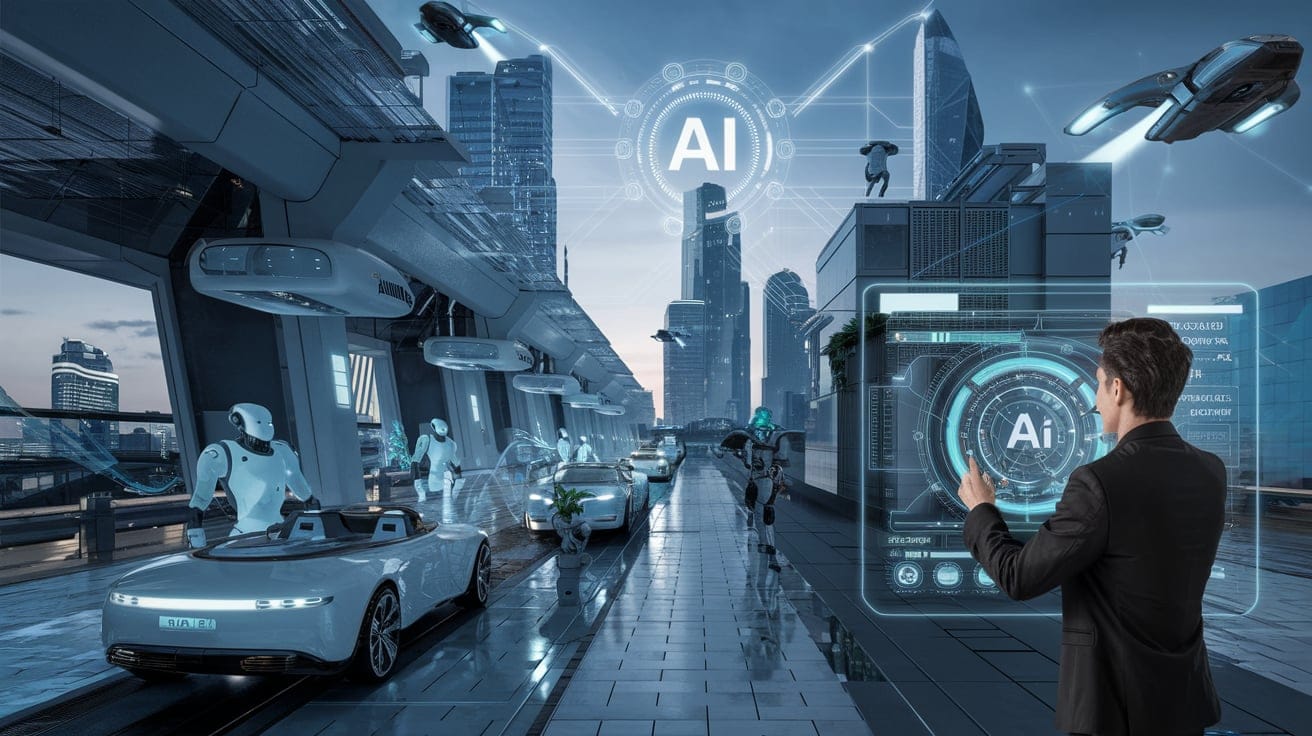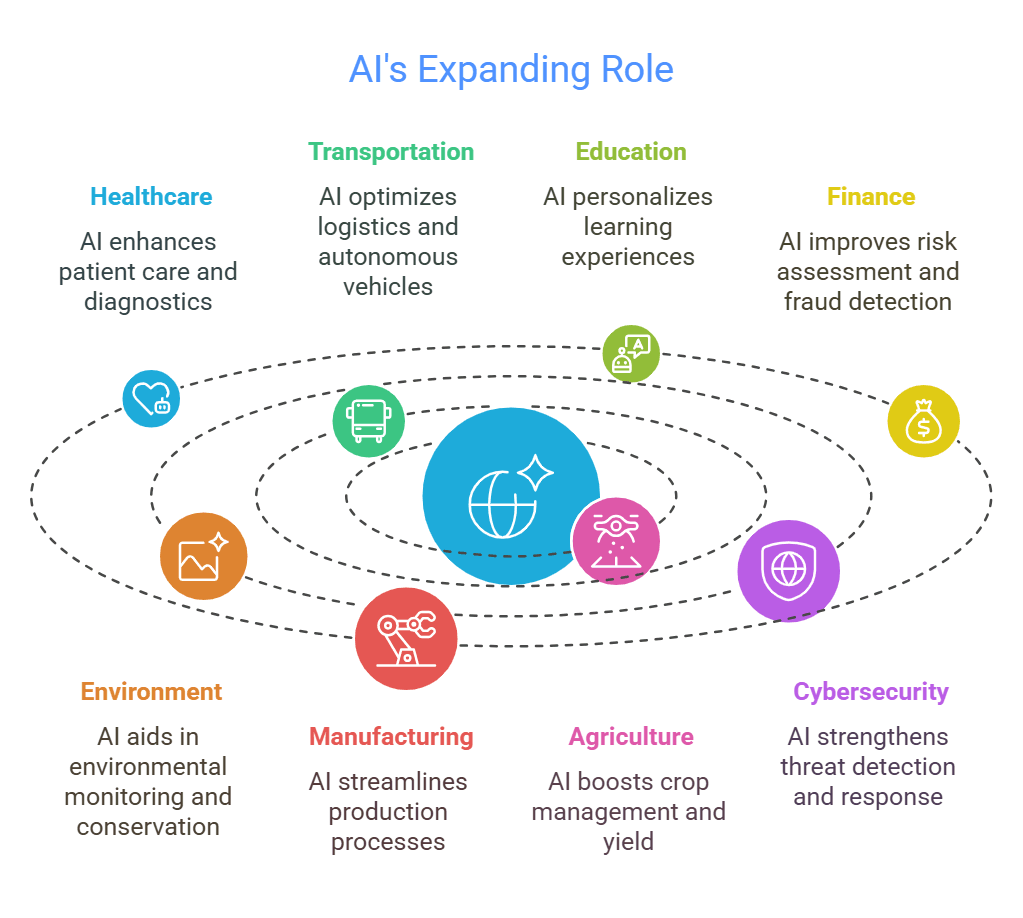

Are you ready to disrupt with AI? Join our Hackathon today! Click to Register
By WebOsmotic Team | Published on January 21, 2025
Summarize Article

Table of Contents
ToggleArtificial intelligence is changing the face of almost every industry, and its potential continues to unfold. AI can be used in its full capacity to augment healthcare systems or to create entirely new modes of transportation. Future uses of AI in various fields including health, education, finance, environment, transport, and even horticulture discussed herein.
AI has opened new avenues that predict AI in future technologies. It is the development of machine learning, natural language processing, and robotics. It has enabled applications that we all have trouble imagining just a decade ago. The expanded AI potential with other advanced technologies like quantum computing, blockchain, and IoT will multiply its impact across sectors.

Future uses in AI provide a boom to be harvested from the healthcare sector. Some of the things that would change the healthcare industry through AI have been:
1. Personalized Medicine: Instead of drumming up a trial-and-error approach among medications, AI algorithms review genetic data and past presentations. It helps in recommending the patient personalized treatment.
2. Early Disease Detection: Symptoms such as cancer or Alzheimer’s may be spotted at an earlier stage with the use of AI-driven assessment technologies. It increases the possibilities of successful treatment.
3. Robotic Surgery: AI-based robotics will further increase the accuracy of specific surgical procedures, with a better effect achieved in fewer recovery days.
4. Easy Healthcare Access: Telemedicine and other forms of healthcare will be made more readily available and within the reach of remote and underserved regions through AI.
AI is going to transform the education experience into being more personalized and much easier to access.
1. Adaptive Learning Systems: AI-based systems will personalize educational material according to the preferences of the student’s learning style and speed.
2. Language Processing Tools: AI tutors involved in language teaching become trouble-free because of the process of natural language processing (NLP).
3. AI facilitates immersive VR classrooms: It makes learning accessible to students as they walk through the 3D models of historical landmarks. It will carry out virtual science experiments in an interactive environment.
4. Administrative Efficiency: Grading and day planner tasks would now be automated, meaning that a teacher will have the time to teach.
The financial type world adopts AI very rapidly for enhancing performance, security, and efficient decision-making:
1. Fraud Detection: AI can easily learn unusual transaction patterns and report potential fraud in real-time.
2. Robo-Advisors: Provides both financial advice and portfolio management, democratizing investments for the rest of us.
3. Credit Risk Assessment: AI models analyze much wider data points to assess the creditworthiness of people in a more refined way.
4. Algorithmic Trading: AI algorithms make instantaneous decisions for trading in markets according to their rules and algorithms, making faster profits.
AI may very well save the world from the hardest environmental problems of this age:
1. AI models can forecast climate trends and then help governments and organizations in better decision-making.
2. AI-Based Biodiversity Monitoring like drones, along with image recognition systems, monitors both animal populations and habitats.
3. AI algorithms provide better management of energy grids integrating fluctuating renewable energy sources.
One field where the effect of AI will be visible as it is going to be on the top is transportation:
1. Driverless Cars would be such AI self-driving cars expected to lessen accidents and increase the efficiency of traffic.
2. Predictive Maintenance can do an immediate monitoring of vehicle performances. AI can predict faults before they lead to the breakdown of the vehicle.
3. Traffic Management consists of the traffic patterns being compiled by AI to improve traffic flow, thus reducing congestion.
4. Smart Logistics takes from demand forecasting to route optimization and delivery timeliness through AI-managed supply chains.
AI is coming into horticulture wherein it will change the way we grow and manage plants:
1. Precision Agriculture: AI-powered systems monitor the health of soil, water levels, and crop growth, enabling farmers to optimize resource use.
2. Automated Harvesting: With the use of AI technologies, robots can discover ripe fruits and vegetables and harvest them at the right time.
3. Pest Control: Early detection with AI systems for pest infestation, together with optimally targeted interventions, greatly reduces the need for chemical pesticides.
4. Greenhouses: Greenhouse environments are controlled by maintaining the optimal temperature and humidity along with the respective levels of light with the help of an AI algorithm.
The future of automated systems is the most influenced by AI, which will eventually alter the entire dimension of how industries operate. A peek into the future includes:
1. Manufacturing; AI-installed robots would perform all repetitive tasks, while humans would be engaged in more creative and strategic area.
2. Retail: AI and automation in the future of customer service and inventory management would improve the shopping experience.
3. Smart Cities: Automation of the city infrastructure, from traffic lights to waste collection, will be managed entirely through AI means.
Good promises for future embeddings save ethical and societal problems, among which are:
The future uses of AI can have multifarious applications: health, education, finance, the environment, transportation, and even horticulture. AI and automation in the future will only continue to change industries and increase the standards of people’s lives in ways that go well beyond today. However, it is essential to ensure that the ethical and environmental challenges are effectively addressed so that the benefits of AI will be realized sustainably and equitably.
By exploring these very surprising transformative possibilities, we glimpse a future where AI will not only be a tool but often be seen as a partner in innovation and progress.
Unlock exclusive insights and expert knowledge delivered straight to your inbox